Let’s talk business, Kenyan business!
Imagine you’re running your dream – maybe it’s that buzzing restaurant in Westlands everyone’s talking about, serving the most delicious pilau.
Or perhaps you’ve got an online shop bursting with trendy clothes, delivered right across Kenya.
Or maybe you offer a service that’s just what people need, like reliable plumbing or expert tech support.
You know your business is good.
You know you offer something valuable.
But here’s the big question for any Kenyan business in 2025: How do you make sure Kenyans actually find you online?
Think about it.
The online world is noisy, isn’t it?
Like a busy market day in Marikiti! Everyone’s shouting for attention. Ads are popping up everywhere. Social media feeds are scrolling nonstop.
It’s easy to get lost in the crowd, even if you have something amazing to offer.
You could try to shout louder than everyone else, spend a fortune on ads, and hope for the best.
But what if there was a smarter way?
A way to attract customers who are already actively looking for exactly what you provide?
That’s where SEO, or Search Engine Optimization in Kenya, comes in – and it’s like having a silent, super-efficient marketing team working for you 24/7.
Instead of chasing after customers and interrupting them with ads, SEO in Nairobi is about making your online shop in Kenya so attractive and easy to find that customers naturally walk in.
It’s what we call ‘inbound marketing’: you make yourself findable, and the right customers come to you. Smart, right?
If you do not have time to go through the entire article, here are the key takeaways.
🔑 Key Takeaways: SEO in Kenya for 2025
- SEO Defined: Search Engine Optimization (SEO) involves enhancing your website to appear higher in Google’s organic (non-paid) search results, making it easier for potential customers in Kenya to find your business online.
- Inbound Marketing Advantage: Unlike traditional advertising that interrupts potential customers, SEO attracts individuals already searching for your products or services, leading to more qualified traffic.
- Importance of Organic Traffic: Organic traffic refers to visitors who find your website through unpaid search results. This type of traffic is cost-effective and often more engaged, as these visitors are actively seeking what you offer.
- Understanding SEO Terms: Familiarity with basic SEO terminology, such as SERPs (Search Engine Results Pages), is essential. SERPs are the pages displayed by search engines in response to a user’s query, and appearing prominently on these pages increases your visibility.
- Strategic Approach: Implementing SEO is a long-term strategy that builds credibility and trust with both search engines and users, leading to sustained online presence and business growth.
With that said, let’s get into the article.
So, what exactly is SEO in Kenya?
Simply put, Search Engine Optimization (SEO) in Kenya is the process of making your website more visible on search engines, especially Google, for people in Kenya.
It’s about optimizing your website so that when Kenyans search for products, services, or information related to your business using keywords on Google, your website appears higher in the organic search results – the free, non-paid listings.
The goal of SEO is to attract more organic traffic to your website, bringing in potential customers who are already searching for what you offer.
Think of Google as the ultimate online directory for Kenya. When someone needs something – anything – they usually ‘Google it’, right?
SEO is the art and science of tweaking your website so that when someone in Kenya searches on Google for things related to your business – like “seo services in Nairobi,” “best smartphones in kenya,” or “mechanic near me” – your website shows up as high as possible in the search results.
Why is SEO in Kenya powerful?
Because you’re attracting organic traffic.
‘Organic traffic’ is just a fancy way of saying visitors who find your website through those unpaid, natural search results on Google.
No ads, no paying for clicks – just people finding you because Google thinks your website is the best answer to their search.
It’s like getting free foot traffic to your shop, but instead of people strolling down the street, they’re browsing online and Google is pointing them straight to your door.
In this article, we will unpack Search Engine Optimization in Kenya and make it crystal clear.
We’ll look at what it really is, why it’s absolutely essential for business growth in Kenya today, and give you practical steps to get started.
Ready to make your business shine online and attract customers who are already looking for you? Let’s get into the world of SEO in Kenya!
Define Common SEO Terms in Kenya
So first, we will define all the common SEO terms in Kenya without any fancy jargon. This way, you understand what we are talking about in a simple and direct way.
Basic SEO Terms
Let us start with the basic SEO terms. If you get these right, you are well on your way to putting your business on the map.
SERPs (Search Engine Results Pages)
Imagine you ask Google a question, like “best Kenyan coffee beans”.
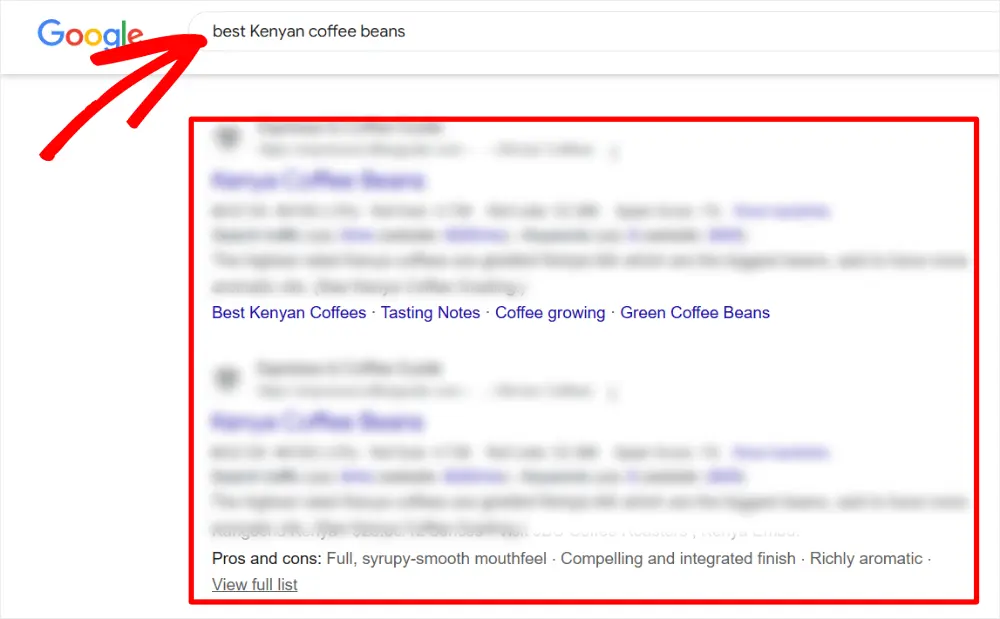
The page you see with all the results – websites, ads, maps – that’s a SERP. It’s basically Google’s answer page to your search.
You want your website to show up as high as possible on these SERPs when people search for things related to your business.
Search Engine
This is the website you use to find information online, like Google, Bing, or Yahoo.
Think of it as a digital librarian. You ask it a question (your search query), and it goes and finds the best ‘books’ (websites) that answer your question.
In Kenya, Google is the main search engine everyone uses. So you should prioritize optimizing your site for Google.
This is not to mean the other search engines should be neglected. Search engines like Bing and DuckDuckGo can still bring in traffic, so make sure you optimize for them as well.
Keyword
These are the words and phrases people type into search engines when they’re looking for something.
For example, if you sell shoes in Nairobi, keywords might be “buy shoes nairobi online,” “men’s leather shoes kenya,” or “affordable ladies shoes cbd.”
Keywords are the bridge between what people are searching for and what your website offers.
Organic Traffic
This is the gold you’re chasing with SEO!
It’s the visitors who come to your website by clicking on those free, natural search results on Google (or other search engines), not the paid ads.
Think of it as free customers walking into your shop because they saw your great window display – except online!
Organic traffic is so valuable because these people are actively looking for something you offer.
Define Advanced SEO Terms
Now that you understand the basic terms in SEO, let us get more specific. SEO optimization is divided into 3 main categories.
Let us discuss them in detail.
On-Page SEO Terms
We will start with on-page SEO. On-page SEO is the process of optimizing individual web pages to improve their rankings in search engines and attract more relevant traffic.
Title Title
This is the main title of your webpage, and it’s super important for SEO.
It shows up as the clickable blue link in Google search results. On top of that, it tells both Google and searchers what your page is about.

Make it catchy and include your main keywords!
Meta Description
This is the short summary that appears below the blue title link in Google search results. Think of it as a mini-ad for your webpage.
It doesn’t directly help your ranking, but a good meta description can entice people to click on your link and visit your site.

URL Slug
This is the last part of your website address (URL), the bit after your domain name.
For example, in www.examplekenyanbusiness.co.ke/womens-shoes, “womens-shoes” is the URL slug.
Make it clear, concise, and use relevant keywords to tell Google and users what the page is about.
Header Tags (H1-H6)
These are tags used to create headings and subheadings on your webpage (like the titles in this article!).
H1 is the main heading (usually the title of the page), H2 are subheadings, and so on. Use them to structure your content logically and include relevant keywords in your headings.
For example, this section you are reading (Header Tags) is under a H4 to make it easy for you to scan through the article.
Alt Text (for images)
This is the text description you add to images on your website.
It helps people who can’t see images (and search engines!) understand what the image is about.
Alt texts are especially important for Google since it cannot read images directly.
Use descriptive alt text and include relevant keywords where it makes sense.
Internal Linking
This is linking from one page on your website to another page on your own website.
It helps users navigate your site, keeps them engaged longer, and also helps Google crawl and understand your website structure better.
External Linking
This is linking from your website to other websites.
Linking to reputable, relevant websites can actually boost your credibility in Google’s eyes and provide extra value to your readers.
Anchor Text
This is the clickable text used in a hyperlink.
For example, in “Learn more about SEO services in Kenya“, “SEO services in Kenya” is the anchor text.
Make your anchor text descriptive and relevant to the page you’re linking to.
Backlink
Imagine another website, maybe a popular Kenyan blog or news site, links to your website.
That’s a backlink!
Backlinks are like votes of confidence from other websites, telling Google your website is trustworthy and valuable.
The more quality backlinks you have, the better for your SEO (we’ll talk more about this in Off-Page SEO).
Content Optimization
This is all about making sure the actual content on your website – the text, images, videos – is high-quality, relevant to your target audience, and optimized for your target keywords.
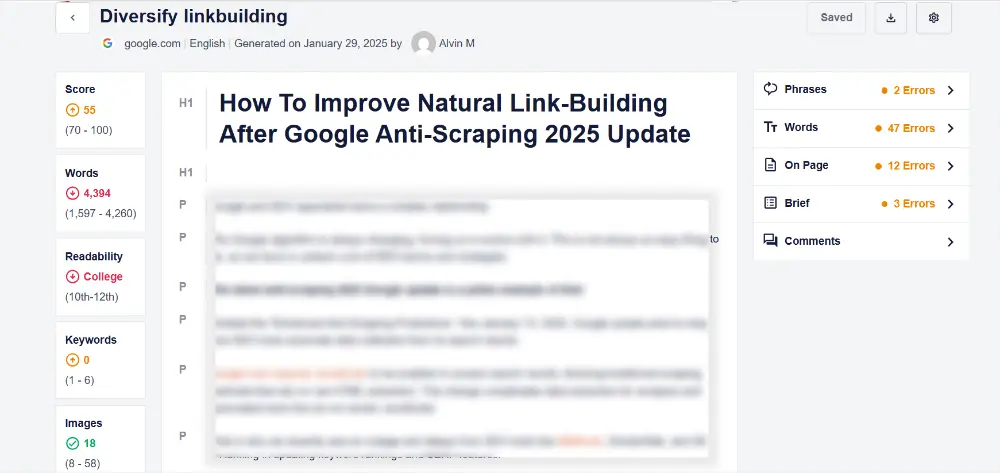
It’s about creating content that both users and search engines will love!
Off-Page SEO Terms
Now that we have talked about things you do for SEO on the page, let’s talk about what you do off the page.
Backlink (deeper dive)
We touched on backlinks in On-Page SEO.
In Off-Page SEO, we focus on getting those backlinks from other websites.
Think of backlinks as online referrals. Quality is key! One backlink from a reputable Kenyan news site is worth way more than ten backlinks from random, low-quality websites.
Types of backlinks include editorial links (naturally earned), directory listings, guest post links, and more.
Domain Authority (DA)
Think of Domain Authority as a website’s overall reputation and trustworthiness in Google’s eyes.
It’s a score (often out of 100) that predicts how well a website will rank in search results.
The higher your DA, the better!
It’s influenced by things like the number and quality of backlinks, website age, and overall SEO health.

Tools like Moz, Ahrefs, and SEMrush estimate DA.
Page Authority (PA)
Similar to Domain Authority, but Page Authority measures the authority of a single webpage, rather than the entire domain.
So, each page on your website has its own PA score.

Link Building
This is the process of actively trying to get backlinks to your website.
It’s like networking in the online world.
Ethical link building is about creating valuable content that other websites will naturally want to link to, reaching out to relevant websites, and building relationships.
Guest Posting
This is a popular link building tactic.
It’s where you write a blog post for another website in your industry (ideally a reputable one).
In exchange, you can include a link back to your website within your author bio or within the content.
It’s a win-win: you get a backlink and reach a new audience, and the other website gets free, quality content.
Define Technical SEO Terms
Now that you understand both on-page and off-page seo terms, let us explain technical SEO terms.
Technical SEO is all about making sure your website works well for search engines.
It is about ensuring that you have the right structure and signals so that search engines can easily crawl, index, and understand your site.
Crawling
Imagine Google has tiny digital spiders (called crawlers or bots) that explore the internet, following links from page to page.
That’s crawling!
It’s how search engines discover new content and updates on websites.
Indexing
Once Google’s crawlers find a webpage, they analyze it and add it to Google’s massive index – think of it like Google’s giant online library.
Indexing means Google has stored and organized your webpage so it can be shown in search results when relevant keywords are searched.
Robots.txt
This is a simple text file on your website that tells search engine crawlers which parts of your website they shouldn’t crawl.
It’s like putting up “Do Not Enter” signs for Google’s spiders, usually for pages that aren’t important for SEO or that you don’t want indexed.
Sitemap (XML Sitemap)
This is like a roadmap of your website for search engines. It’s a file that lists all the important pages on your website, helping Google find and crawl all your content more efficiently.
It’s especially helpful for large websites.
Now, to view your sitemap, all you have to do is add “/sitemap.xml” to your URL. For example, to view the sitemap of AMdigtlake.com, I will type in “amdigitalke.com/sitemap.xml.”
You should get something that looks like the screenshot below if added correctly.
You should see the number of URLs in your sitemap and the last time it was updated.

Canonical URL
Sometimes you might have very similar content on different URLs (e.g., different versions of a product page).
A canonical URL tells search engines which version is the main or preferred version, avoiding duplicate content issues.
Schema Markup (Structured Data)
This is extra code you can add to your website to help search engines understand your content even better.
It’s like adding labels to your content so Google knows “this is a product,” “this is a review,” “this is an event.”
Schema markup can lead to “rich results” in search – those fancy snippets with extra information like star ratings or prices that stand out in search results.
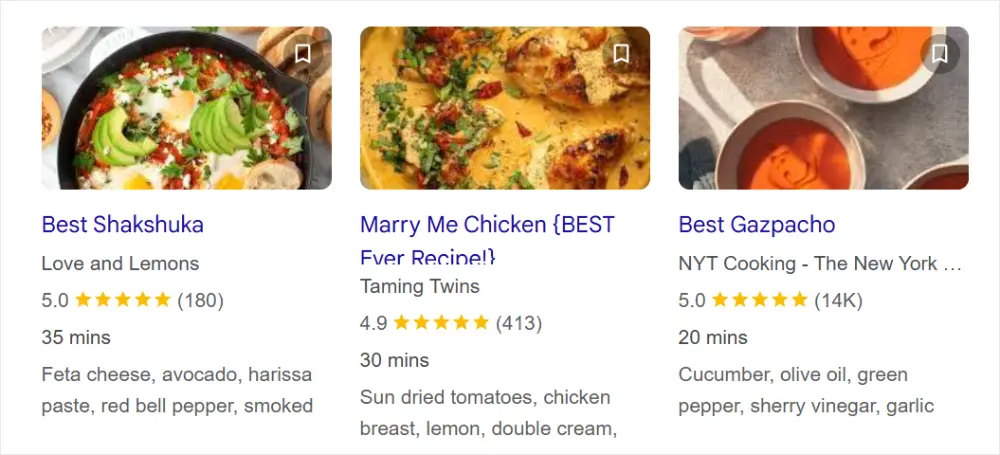
Mobile-Friendliness (Mobile-First Indexing)
With so many Kenyans using phones to access the internet, your website must work perfectly on mobile.
Mobile-friendliness means your website is easy to view and use on smartphones and tablets.
Google now uses “mobile-first indexing,” meaning it primarily uses the mobile version of your website for indexing and ranking.
Page Speed
How fast your website loads is crucial for both users and SEO.
Slow websites frustrate visitors, and Google also considers page speed as a ranking factor.
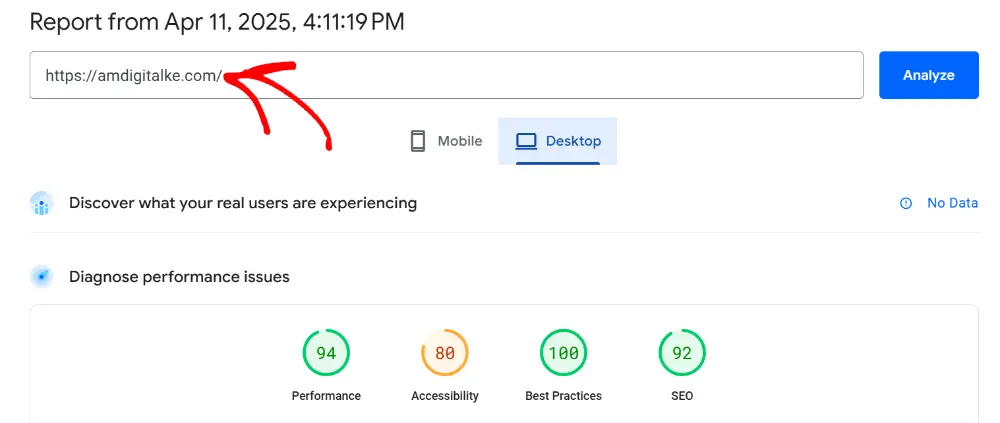
Faster websites are better for everyone!
HTTPS
This is the secure version of the Internet Protocol (the “S” stands for secure).
HTTPS encrypts communication between a user’s browser and your website, protecting data.
Google considers HTTPS a ranking signal, and it’s important for user trust and security.
Make sure your website uses HTTPS!
Well Done! You now have a stronger understanding of SEO in Kenya and how you can get started.
Now that you understand the terminologies, let us look at how SEO actually works in Kenya.
How SEO Works: The Virtual Building Analogy for Kenya
Have you ever noticed in Nairobi how businesses selling similar things often cluster together in one area?
Like if you want to buy electronics, you head to Luthuli Avenue, right?
Or if you’re looking for clothes, Biashara Street is the place to be.
Or how do you go to Kirinyaga Road the moment you want car spare parts?

Now, why do businesses do this?
It might seem like they’re just creating more competition for themselves, but actually, it’s smart business!
When you group similar businesses together, you create a destination for customers who are specifically looking for those products.
If someone knows they want to buy a new phone, and they know Luthuli Avenue is the place for phones, they’ll head straight there.
Because they are already in a ‘phone-buying zone’, the chances of them actually making a purchase are much higher!
It’s all about attracting customers who have high intent – they are already in the mindset to buy.
Now, think of Google as a giant virtual building for everything online.

When people search on Google, they are essentially entering this massive virtual marketplace looking for something specific.
And Google’s search results pages (SERPs) are like the different floors in this building.
Page 1 of Google search results?
That’s like the ground floor or the first floor of this virtual building.
It’s where everyone entering the building sees first. It’s the most visible, has the most foot traffic, and gets the most attention.
Pages 2, 3, and beyond?
Those are like the upper floors – people might venture there, but most will stick to the ground and first floors because they usually find what they need right there.
What does this mean in the SEO world?
So, in the world of SEO, getting your website onto Page 1 of Google is like having prime real estate on the ground floor of this virtual building.
That’s where the majority of potential customers will see you and are most likely to ‘walk into your shop’ (click on your website).
Now, how does Google decide which websites get the prime spots on Page 1?
That’s where ranking factors come in.
Google is like the landlord of this virtual building, and they want to put the best and most relevant businesses in the most visible spots.
Google wants to make sure people searching find what they need quickly and easily.
The search engine considers many things when ranking websites, but some of the most important are:
- Relevance: Is your website truly relevant to what people are searching for? Does your content actually answer their questions and meet their needs? Google wants to show the most relevant results first.
- Authority: Is your website trustworthy and credible? Does it have expertise in its field? Google looks for signals of authority, like backlinks from reputable websites, to judge trustworthiness.
- User Experience: Is your website easy to use? Is it fast, mobile-friendly, and well-designed? Google cares about user satisfaction, so websites that provide a good user experience tend to rank higher.
Congratulations! You now properly understand what SEO is in Kenya. If anything is not clear, check out the commonly asked questions below.
FAQs: What is SEO in Kenya?
What is SEO?
SEO, or Search Engine Optimization in Kenya, is essentially about boosting your website’s visibility on Google. It’s the process of fine-tuning your site so that when Kenyans search for relevant terms, your website appears higher in the search results. Think of it as making your online business easily discoverable by those who are actively looking for what you offer.
What are SEO keywords?
Keywords are the words and phrases people in Kenya use when searching on Google. They are the bridge connecting customer searches to your website’s content. For example, if you sell shoes, relevant keywords could be “buy shoes online Nairobi” or “affordable leather shoes Kenya.” Understanding and using these keywords is key to SEO.
What are the top SEO terms for beginners?
For those new to SEO, focus on understanding a few core terms. These include Keywords (search terms), Organic Traffic (free search visitors), On-Page SEO (website optimization), Off-Page SEO (reputation building), and Google Search Console (performance monitoring). Grasping these basics provides a solid foundation for your SEO journey.
How does SEO make my site rank higher?
Imagine Google as a virtual shopping mall. SEO in Nairobi is like optimizing your shop within this mall to be attractive and well-organized. By making your website relevant, trustworthy, and user-friendly, you signal to Google that your site deserves a prime location – higher rankings – leading to increased visibility and customer traffic, just like a popular shop in a mall.
Final Verdict: What is SEO in Nairobi?
SEO, in essence, is about optimizing your website’s ‘shopfront’ to be as attractive and effective as possible within this virtual building that is Google.
It’s about making your website relevant, authoritative, and user-friendly, so that Google will want to place you on that valuable ground floor – Page 1 – where you can attract the most customers and grow your Kenyan business.
Now, if this sounds super complicated to you.
Do not worry, AM Digital KE has you covered.
We can help you optimize your Website so that you can dominate the Kenyan SERPs.
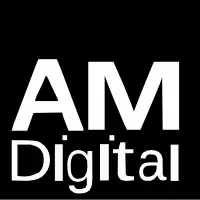

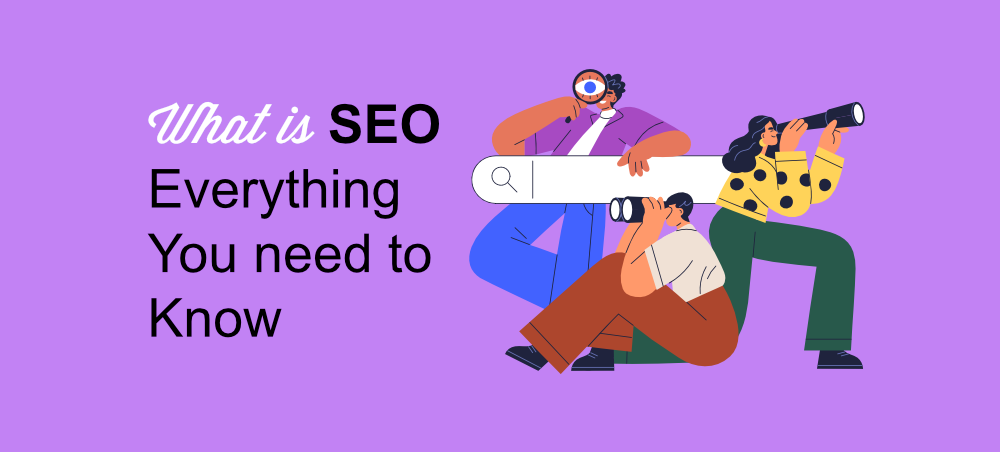

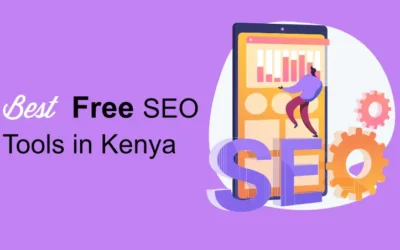
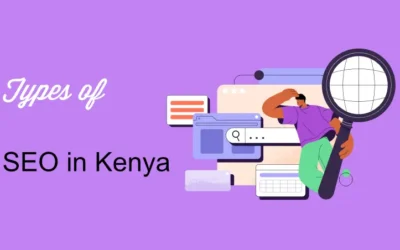
0 Comments